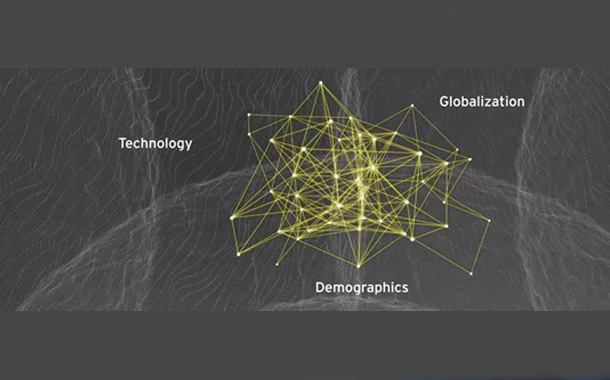2018 EY report demonstrates how human augmentation will reinvent work, consumer behavior and regulation
EY revealed several new megatrends in its most recent report, The upside of disruption: megatrends shaping 2018 and beyond. The report predicts that we are entering “the era of human augmentation,” which will transform many aspects of everyday and business life, from work to human behavior to the consumer experience, and will require fundamentally different approaches to regulation. The report also analyzes the reinvention of food production, manufacturing, urbanization and health care.
Authored by the EY global think tank EYQ, the megatrends report explores “what’s after what’s next?” by identifying emerging trends that should be on leaders’ radars and the longer-term realignment of markets, society and the global order. It provides a framework for understanding where disruption comes from and where it’s headed, giving leaders a way to anticipate, prepare and strategically respond.
Uschi Schreiber, EY Global Vice Chair – Markets and Chair of Global Accounts Committee, says, “Today’s corporate leaders almost universally see disruption as both an opportunity and an existential threat. But to seize the opportunity and find the upside of disruption, leaders need to understand where disruption is coming from, where it’s headed and what it means for them.”
According to the report, the emergence of a new “era of human augmentation,” such as artificial intelligence (AI), robotics, and augmented and virtual reality (AR and VR) will become increasingly lifelike and act autonomously on our behalf. This will drive an unprecedented reinvention of work, consumer behavior and regulation. As AI and robotics enter more occupations, they will redefine the nature of work, with implications for everything from economic inequality to social contracts and education policy.
“Super consumers” will be empowered by technologies that enhance human decision-making and create more informed and richer consumer experiences. Companies will be challenged to meet the higher expectations of these consumers.
The report cites the rise of consumer concerns about AI and autonomous vehicles as technologies become more life-like, engendering fears and resistance. To boost adoption, companies will need to create new approaches to design, informed by psychology and behavioral economics.
Technologies such as AI and autonomous vehicles will challenge existing regulations. But the report suggests that disruptive technologies could also enable new regulatory approaches that are built on open data, conducted in real-time, and dynamically adapt to changing market conditions.
The report cites a number of technologies that are projected to reinvent agriculture and manufacturing, making them radically more efficient and sustainable. Vegetable-based alternatives and lab-grown approaches promise to sustainably feed the planet’s growing appetite for protein. Meanwhile, digitally enabled vertical farms are bringing food production closer to urban consumers and giving them fresh, local and organic choices.
Manufacturing is also undergoing a revolution at the intersection of the physical, digital and biological sciences. Innovation at the nanoscale will introduce smarter and cleaner materials, while AI and robotics will make factories more productive, and 3D printing will bring production closer to needs and shorten supply chains.
The report suggests a future of urbanization where the convergence of climate change, aging populations, the future of mobility and the future of work will change where and how cities are built and how they are operated. Climate change could relocate city centers, while painless commutes and virtual work could lead to a more balanced, less congested, urban model. In addition, the forces of disruption will help revive legacy and smaller cities that offer lower costs and higher quality of life. These cities could become hubs of innovation as technologies such as 3D printing, AR and VR, Internet of Things (IoT) and AI democratize and decentralize innovation and production.
Health care will also be disrupted by technologies and business models that are making health predictive, personalized, proactive and participatory. This will include everything from AI reinventing drug R&D to robotic caregivers and autonomous vehicles, enabling seniors to age independently.




